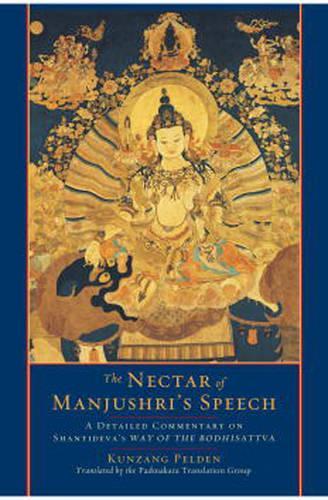
The Nectar of Manjushri's Speech: A Detailed Commentary on Shantideva's Way of the Bodhisattva
(Paperback)
Publishing Details
The Nectar of Manjushri's Speech: A Detailed Commentary on Shantideva's Way of the Bodhisattva
By (Author) Kunzang Pelden
Translated by Padmakara Translation Group
Shambhala Publications Inc
Shambhala Publications Inc
1st July 2010
22nd February 2010
United States
Classifications
General
Non Fiction
294.385
Physical Properties
Paperback
512
Width 152mm, Height 228mm, Spine 30mm
646g
Description
"The Bodhicharyavatara", or Way of the Bodhisattva, composed by the eighth-century Indian master Shantideva, has occupied an important place in the Tibetan Buddhist tradition throughout its history. It is a guide to cultivating the mind of enlightenment through generating the qualities of love, compassion, generosity, and patience. Kunzang Pelden studied with several great masters who guided him in his contemplations of this classic text.
Reviews
If I have any understanding of compassion and the practice of the bodhisattva path, it is entirely on the basis of this text [The Way of the Bodhisattva] that I possess it.H. H. the Dalai Lama
This is a must-have, must-read, must-contemplate, and must-follow book for those who wish to exercise the privilege of being heir to Shakyamuni Buddhas unique heritage.Dzongsar Jamyang Khyentse, author of What Makes You Not a Buddhist
What a tremendous blessing and joy it is that Khenpo Kunpels renowned commentary on the Bodhicharyavatara, based on the definitive oral instructions of the great saint and master of compassion Patrul Rinpoche, is now available in such a fluent and authoritative translation. This is a modern classic for our timesan exceptionally clear and comprehensive guide to Shantidevas timeless verses, an encyclopedic treasury of Buddhist wisdom, and an inspiring companion for all who seek to follow the compassionate path of the bodhisattvas.Sogyal Rinpoche, author of The Tibetan Book of Living and Dying
Author Bio
Kunzang Pelden (sometimes known as Khenpo Kunpel) was born in Tibet in 1862. Renowned for his spiritual realization, he was one of the great monk-scholars of the nonsectarian movement and was instrumental in the preservation of the oral traditions and teachings of the Nyingma school.
